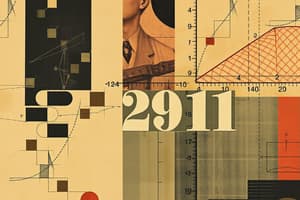Podcast
Questions and Answers
What is a series in mathematics?
What is a series in mathematics?
- The sum of the terms of a sequence (correct)
- The multiplication of the terms of a sequence
- Subtracting the terms of a sequence
- Dividing the terms of a sequence
What are two common types of sequences mentioned in the text?
What are two common types of sequences mentioned in the text?
- Arithmetic and geometric sequences (correct)
- Even and odd sequences
- Prime and composite sequences
- Algebraic and calculus sequences
What is the distinguishing feature of an infinite series?
What is the distinguishing feature of an infinite series?
- It involves only odd numbers
- It continues indefinitely (correct)
- It has a limited number of terms
- It involves only prime numbers
What type of series involves adding together a finite number of terms?
What type of series involves adding together a finite number of terms?
What is Sigma notation used for in mathematics?
What is Sigma notation used for in mathematics?
Which type of series can theoretically go on forever?
Which type of series can theoretically go on forever?
What is the primary difference between finite and infinite series?
What is the primary difference between finite and infinite series?
Which notation uses the Greek letter Σ to represent the sum of a sequence?
Which notation uses the Greek letter Σ to represent the sum of a sequence?
What does a finite series involve?
What does a finite series involve?
Why are infinite series considered more complex?
Why are infinite series considered more complex?
What does 'i' represent in the formula for sigma notation?
What does 'i' represent in the formula for sigma notation?
In the example with a geometric series where a = 2 and r = 2, how many terms are summed in total?
In the example with a geometric series where a = 2 and r = 2, how many terms are summed in total?
For an arithmetic series with T1 = 31 and common difference d = -7, what is the sum of the first five terms?
For an arithmetic series with T1 = 31 and common difference d = -7, what is the sum of the first five terms?
What is the formula used to calculate the sum of a geometric series with first term a and common ratio r?
What is the formula used to calculate the sum of a geometric series with first term a and common ratio r?
Which field does NOT have practical applications for series according to the text?
Which field does NOT have practical applications for series according to the text?
What are the rules mentioned for manipulating series in sigma notation?
What are the rules mentioned for manipulating series in sigma notation?
What does 'm' represent in the formula for sigma notation?
What does 'm' represent in the formula for sigma notation?
In a geometric series where a = 2 and r = 2, what is the value of the sum (Sn) for the first six terms?
In a geometric series where a = 2 and r = 2, what is the value of the sum (Sn) for the first six terms?
What is used as a common factor in calculating sums for sequences in sigma notation?
What is used as a common factor in calculating sums for sequences in sigma notation?
What does the index 'i' represent in the formula for sigma notation?
What does the index 'i' represent in the formula for sigma notation?
In an arithmetic series with T1 = 31 and a common difference d = -7, what is the value of T3?
In an arithmetic series with T1 = 31 and a common difference d = -7, what is the value of T3?
What is the result of the sum of the first six terms of an arithmetic series with T1 = 31 and common difference d = -7?
What is the result of the sum of the first six terms of an arithmetic series with T1 = 31 and common difference d = -7?
In a geometric series where a = 2 and r = 2, what is the value of the common ratio (r)?
In a geometric series where a = 2 and r = 2, what is the value of the common ratio (r)?
What type of series involves adding together an infinite number of terms?
What type of series involves adding together an infinite number of terms?
If a geometric series has a = 2 and r = 3, what is the sum of the first four terms?
If a geometric series has a = 2 and r = 3, what is the sum of the first four terms?
For an arithmetic series with T1 = 31 and common difference d = -7, what does T5 equal?
For an arithmetic series with T1 = 31 and common difference d = -7, what does T5 equal?
What is the correct formula for finding the sum of an arithmetic series with 'n' terms?
What is the correct formula for finding the sum of an arithmetic series with 'n' terms?
In a geometric series where a = 2 and r = 0.5, what is the sum (Sn) for the first five terms?
In a geometric series where a = 2 and r = 0.5, what is the sum (Sn) for the first five terms?
What is an arithmetic series characterized by?
What is an arithmetic series characterized by?
Which of the following best describes a series?
Which of the following best describes a series?
What type of series involves adding a finite number of terms?
What type of series involves adding a finite number of terms?
Which of the following is an example of an infinite series?
Which of the following is an example of an infinite series?
What is the primary purpose of sigma notation?
What is the primary purpose of sigma notation?
Which of the following sequences is an example of an arithmetic sequence?
Which of the following sequences is an example of an arithmetic sequence?
Which of the following sequences is an example of a geometric sequence?
Which of the following sequences is an example of a geometric sequence?
What is the primary reason why infinite series are considered more complex than finite series?
What is the primary reason why infinite series are considered more complex than finite series?
In the sigma notation $\sum_{i=1}^{n} a_i$, what does the variable 'i' represent?
In the sigma notation $\sum_{i=1}^{n} a_i$, what does the variable 'i' represent?
If a finite series has the form $\sum_{i=1}^{5} 2i$, what is the sum of the series?
If a finite series has the form $\sum_{i=1}^{5} 2i$, what is the sum of the series?
Which of the following fields does NOT have practical applications for series, according to the text?
Which of the following fields does NOT have practical applications for series, according to the text?
For an infinite geometric series with first term $a$ and common ratio $r$, what is the condition for the series to converge?
For an infinite geometric series with first term $a$ and common ratio $r$, what is the condition for the series to converge?
What is the sum of the infinite geometric series $\sum_{i=0}^{\infty} \frac{1}{2^i}$?
What is the sum of the infinite geometric series $\sum_{i=0}^{\infty} \frac{1}{2^i}$?
For an arithmetic series with first term $a$ and common difference $d$, what is the sum of the first $n$ terms?
For an arithmetic series with first term $a$ and common difference $d$, what is the sum of the first $n$ terms?
If $\sum_{i=1}^{n} i^2 = \frac{n(n+1)(2n+1)}{6}$, what is the value of $\sum_{i=1}^{10} i^2$?
If $\sum_{i=1}^{n} i^2 = \frac{n(n+1)(2n+1)}{6}$, what is the value of $\sum_{i=1}^{10} i^2$?
What is the sum of the infinite series $\sum_{i=1}^{\infty} \frac{1}{i(i+1)}$?
What is the sum of the infinite series $\sum_{i=1}^{\infty} \frac{1}{i(i+1)}$?
If $\sum_{i=1}^{n} i^3 = \left(\frac{n(n+1)}{2}\right)^2$, what is the value of $\sum_{i=1}^{5} i^3$?
If $\sum_{i=1}^{n} i^3 = \left(\frac{n(n+1)}{2}\right)^2$, what is the value of $\sum_{i=1}^{5} i^3$?
What is the sum of the infinite series $\sum_{i=1}^{\infty} \frac{(-1)^{i+1}}{i}$?
What is the sum of the infinite series $\sum_{i=1}^{\infty} \frac{(-1)^{i+1}}{i}$?
If $\sum_{i=1}^{n} i^4 = \frac{n(n+1)(3n^2+3n-1)}{30}$, what is the value of $\sum_{i=1}^{6} i^4$?
If $\sum_{i=1}^{n} i^4 = \frac{n(n+1)(3n^2+3n-1)}{30}$, what is the value of $\sum_{i=1}^{6} i^4$?
What is the sum of the infinite series $\sum_{i=1}^{\infty} \frac{1}{i^2}$?
What is the sum of the infinite series $\sum_{i=1}^{\infty} \frac{1}{i^2}$?
If $\sum_{i=1}^{n} i^5 = \frac{n^2(n+1)^2(2n^2+2n-1)}{12}$, what is the value of $\sum_{i=1}^{4} i^5$?
If $\sum_{i=1}^{n} i^5 = \frac{n^2(n+1)^2(2n^2+2n-1)}{12}$, what is the value of $\sum_{i=1}^{4} i^5$?
What is the sum of the first 6 terms of the arithmetic series with T1 = 5 and d = 3?
What is the sum of the first 6 terms of the arithmetic series with T1 = 5 and d = 3?
If $\sum_{i=2}^{5} i^3 = 218$, what is the value of $\sum_{i=1}^{4} i^3$?
If $\sum_{i=2}^{5} i^3 = 218$, what is the value of $\sum_{i=1}^{4} i^3$?
Evaluate $\sum_{i=1}^{4} \frac{i}{i+1}$
Evaluate $\sum_{i=1}^{4} \frac{i}{i+1}$
What is the sum of the infinite geometric series with a = 2 and r = 0.5?
What is the sum of the infinite geometric series with a = 2 and r = 0.5?
If $\sum_{i=1}^{n} i^2 = \frac{n(n+1)(2n+1)}{6}$, what is the value of $\sum_{i=1}^{10} i^2$?
If $\sum_{i=1}^{n} i^2 = \frac{n(n+1)(2n+1)}{6}$, what is the value of $\sum_{i=1}^{10} i^2$?
Evaluate $\sum_{i=2}^{6} \frac{1}{i(i-1)}$
Evaluate $\sum_{i=2}^{6} \frac{1}{i(i-1)}$
If $\sum_{i=1}^{n} ar^{i-1} = \frac{a(1-r^n)}{1-r}$ for $r \neq 1$, what is the value of $\sum_{i=1}^{5} 2(0.5)^{i-1}$?
If $\sum_{i=1}^{n} ar^{i-1} = \frac{a(1-r^n)}{1-r}$ for $r \neq 1$, what is the value of $\sum_{i=1}^{5} 2(0.5)^{i-1}$?
What is the sum of the infinite geometric series with a = 3 and r = -0.5?
What is the sum of the infinite geometric series with a = 3 and r = -0.5?
Evaluate $\sum_{i=1}^{\infty} \frac{1}{2^i}$
Evaluate $\sum_{i=1}^{\infty} \frac{1}{2^i}$
If $\sum_{i=1}^{n} i(i+1) = \frac{n(n+1)(n+2)}{3}$, evaluate $\sum_{i=1}^{8} i(i+1)$
If $\sum_{i=1}^{n} i(i+1) = \frac{n(n+1)(n+2)}{3}$, evaluate $\sum_{i=1}^{8} i(i+1)$




